Radiologists should avoid MR imaging COVID-19 patients ‘except where absolutely necessary’
Radiologists should avoid performing MRI exams on patients diagnosed with, or suspected of having, COVID-19.
That’s according to new guidance on the deployment of magnetic resonance imaging during the pandemic issued by the American College of Radiology (ACR) April 8. ACR advises its members to only deploy this modality for such patients “where absolutely necessary” and to postpone any non-urgent MR studies.
“In some cases, the use of alternative imaging methods such as point of care or portable imaging may be appropriate,” the ACR noted in its Wednesday guidance, later adding that “the impact of the results of the imaging must potentially affect imminent clinical management.”
Here are a few more recommendations from the document (which you can read in its entirety for free here):
- Cleaning guidance: Disinfection protocols will vary based on the MRI machine’s location and the availability of personal protective equipment, among other factors. In general, the ACR recommends 60 minutes of down time between exams followed by a thorough cleansing of all surfaces.
- Mask use: If there is a metal strip in an inpatient’s mask, they should be fit with an MR-safe alternative prior to visiting the radiology department. If that’s not possible, providers should remove metallic components from face masks before entering the imaging suite and, where feasible, substitute them with tape.
- PPE options: Powered air-purifying respirators should not be brought into Zone IV due to the potential risks of adverse interactions with ferromagnetic components. In general, ACR recommends mitigating risk by ensuring that no magnetic components are present in PPE and, if so, MRI providers should remove them and temporarily replace with tape.

